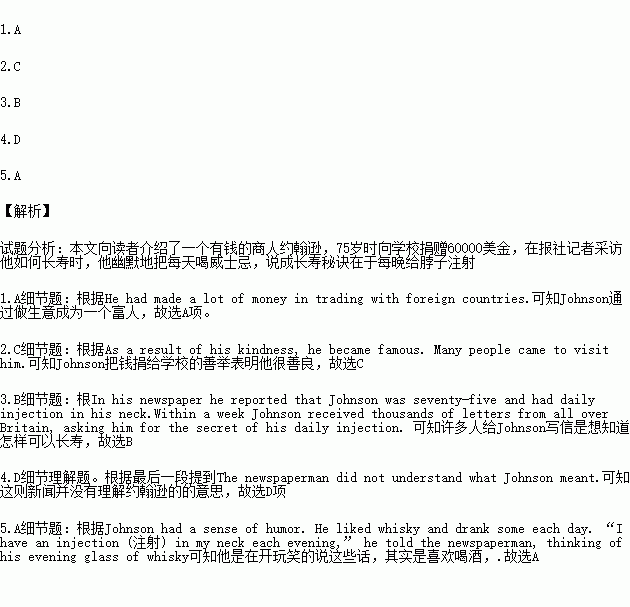题目内容
Not many years ago, a wealthy and rather strange old man named Johnson lived alone in a village in the south of England. He had made a lot of money in trading with foreign countries. When he was seventy-five, he gave£12,000 to the village school to buy land and equipment for a children’s playground.
As a result of his kindness, many people came to visit him. Among them was a newspaperman. During their talk, Johnson remarked that he was seventy-five and expected to live to be a hundred. The newspaperman asked him how he managed to be healthy at seventy-five. Johnson had a sense of humor. He liked whisky and drank some each day. “I have an injection (注射) in my neck each evening,” he told the newspaperman, thinking of his evening glass of whisky.
The newspaperman did not understand what Johnson meant. In his newspaper he reported that Johnson was seventy-five and had a daily injection in his neck. Within a week Johnson received thousands of letters from all over Britain, asking him for the secret of his daily injection.
1. Johnson became a rich man through ___________.
A. doing business B. making whisky
C. cheating D. buying and selling land
2. The gift of money to the school suggests (暗示) that Johnson ___________.
A. had no children
B. was a strange man
C. was very warm-hearted and fond of children
D. wanted people to know how rich he was
3.Many people wrote to Johnson to find out ___________.
A. what kind of whisky he had
B. how to live longer
C. how to become wealthy
D. what to inject in his neck
4. The newspaperman ___________.
A. should have reported what Johnson had told him
B. shouldn’t have asked Johnson what injection he had
C. was eager to live a long life
D. should have found out what Johnson really meant
5. When Johnson said he had an injection in his neck each evening, he really meant that ________.
A. he liked drinking a glass of whisky in the evening
B. he needn’t an injection in the neck
C. a daily injection in the evening would make him sleep well
D. there was something wrong with his neck


 cts about being fat and doing exercise.
cts about being fat and doing exercise.